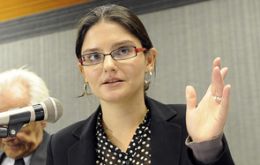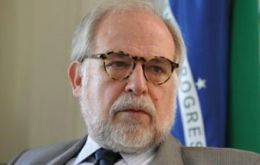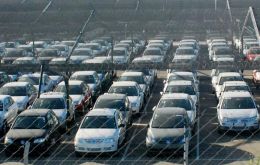MercoPress. South Atlantic News Agency
Tag: trade barriers
-
Thursday, February 9th 2012 - 07:42 UTC
Argentine importers warn about ‘complications’ with new imports scheme

The head of the Importers Chamber of Argentina, Diego Pérez Santisteban, warned that the new imports controls applied by the government “is complicated,” and affects the bigger companies more than the small and medium ones of the sector.
-
Wednesday, February 8th 2012 - 06:21 UTC
Uruguayan cabinet divided over how to address Argentine trade restrictions

The latest round of imports’ restrictions imposed by the government of President Cristina Fernandez and how to address them have triggered a serious debate inside the ministerial cabinet of Uruguayan president Jose Mujica.
-
Wednesday, February 8th 2012 - 06:17 UTC
Argentina and Brazil want corporations to reinvest and not send profits overseas

President Cristina Fernandez hopes to convince Brazil to join Argentina in its campaign against the multinational corporations in an effort to balance trade balances in the midst of the global crisis spurred by the Euro crisis, China’s slow reaction and the US economy which still has to recover from the full impact of the 2008/09 recession.
-
Tuesday, February 7th 2012 - 06:15 UTC
Argentina/Brazil admit ‘good understanding’ in round of trade talks to lift restrictions

The meeting between Argentine and Brazilian officials to discuss the new trade legislation implemented by the government of President Cristina Fernandez ended in a “good understanding”, said participants of the Monday meeting.
-
Monday, February 6th 2012 - 07:16 UTC
Uruguayan president downplays the impact of Argentine imports’ restrictions

The new trade barriers enforced by the Argentine government are “insignificant, nothing to worry about,” Uruguayan president José Mujíca said to a Montevideo newspaper insisting that the best path is ‘dialogue’ dismounting each obstacle ‘step by step’.
-
Thursday, February 2nd 2012 - 05:47 UTC
Brazil will evaluate the impact and legality of Argentina’s latest trade barriers

The Brazilian government expressed concerns over the new Argentine trade barriers going in effect on Wednesday and informed that it would “evaluate its impact and legality” before making any decisions, Foreign Trade secretary Tatiana Prazeres announced.
-
Monday, January 30th 2012 - 21:11 UTC
For Brazil Argentina is a “good problem”, no longer a “permanent problem”

Argentina is “a good problem” for Brazil, said President Dilma Rousseff’s Foreign policy advisor Marco Aurelio Garcia ahead of another trade dispute when Argentina begins applying a new imports’ scheme that has been equally criticized by local and Brazilian manufacturers.
-
Wednesday, October 19th 2011 - 16:51 UTC
EC report claims Argentina and Brazil are increasing trade barriers

Major trading nations led by Argentina, Brazil and Russia are raising barriers to international and threatening the global economic recovery, the European Union's executive arm said on Wednesday.
-
Friday, July 15th 2011 - 06:25 UTC
Argentina denies restrictions in trade with Brazil; admits ‘logical differences’

Argentina’s trade relation with Brazil does not have restrictions and “it’s understandable that some differences surface” when bilateral trade will be reaching over 40 billion dollars this year, said Argentine Industry Ministry sources in Buenos Aires.
-
Thursday, June 30th 2011 - 06:53 UTC
Trade problems between Brazil and Argentina ‘persist’, but can be managed

Trade problems between Mercosur two main partners ‘subsist’, but both sides are optimistic that they can be solved. The revelation in the framework of the Mercosur summit follows weeks of discussions and paralyzing trade, sometimes for weeks at the borders.
